Metascience
| Part of a series on |
| Evidence-based practices |
|---|
|
|
Metascience (also known as meta-research) is the use of
In 1966, an early meta-research paper examined the
Measures have been implemented to address the issues revealed by metascience. These measures include the
History
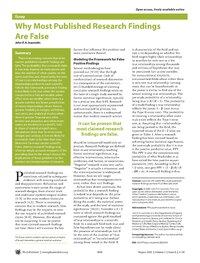
In 1966, an early meta-research paper examined the
Many prominent publishers are interested in meta-research and in improving the quality of their publications. Top journals such as
The first international conference in the broad area of meta-research was the Research Waste/EQUATOR conference held in Edinburgh in 2015; the first international conference on peer review was the Peer Review Congress held in 1989.[14] In 2016, Research Integrity and Peer Review was launched. The journal's opening editorial called for "research that will increase our understanding and suggest potential solutions to issues related to peer review, study reporting, and research and publication ethics".[15]
Fields and topics of meta-research

Metascience can be categorized into five major areas of interest: Methods, Reporting, Reproducibility, Evaluation, and Incentives. These correspond, respectively, with how to perform, communicate, verify, evaluate, and reward research.[1]
Methods
Metascience seeks to identify poor research practices, including
Scientific data science
Scientific data science is the use of
Journalology
Journalology, also known as publication science, is the scholarly study of all aspects of the
Reporting
Meta-research has identified poor practices in reporting, explaining, disseminating and popularizing research, particularly within the social and health sciences. Poor reporting makes it difficult to accurately interpret the results of scientific studies, to replicate studies, and to identify biases and conflicts of interest in the authors. Solutions include the implementation of reporting standards, and greater transparency in scientific studies (including better requirements for disclosure of conflicts of interest). There is an attempt to standardize reporting of data and methodology through the creation of guidelines by reporting agencies such as CONSORT and the larger EQUATOR Network.[1]
Reproducibility
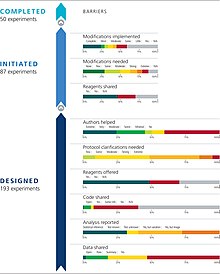
The replication crisis is an ongoing
Moreover, replication of research (or failure to replicate) is considered less influential than original research, and is less likely to be published in many fields. This discourages the reporting of, and even attempts to replicate, studies.[31][32]
Evaluation and incentives
Metascience seeks to create a scientific foundation for peer review. Meta-research evaluates peer review systems including pre-publication peer review, post-publication peer review, and open peer review. It also seeks to develop better research funding criteria.[1]
Metascience seeks to promote better research through better incentive systems. This includes studying the accuracy, effectiveness, costs, and benefits of different approaches to ranking and evaluating research and those who perform it.
Contributorship
Studies proposed machine-readable standards and (a taxonomy of) badges for science publication management systems that hones in on contributorship – who has contributed what and how much of the research labor – rather that using traditional concept of plain authorship – who was involved in any way creation of a publication.[38][39][40][41] A study pointed out one of the problems associated with the ongoing neglect of contribution nuanciation – it found that "the number of publications has ceased to be a good metric as a result of longer author lists, shorter papers, and surging publication numbers".[42]
Assessment factors
Factors other than a submission's merits can substantially influence peer reviewers' evaluations.[43] Such factors may however also be important such as the use of track-records about the veracity of a researchers' prior publications and its alignment with public interests. Nevertheless, evaluation systems – include those of peer-review – may substantially lack mechanisms and criteria that are oriented or well-performingly oriented towards merit, real-world positive impact, progress and public usefulness rather than analytical indicators such as number of citations or altmetrics even when such can be used as partial indicators of such ends.[44][45] Rethinking of the academic reward structure "to offer more formal recognition for intermediate products, such as data" could have positive impacts and reduce data withholding.[46]
Recognition of training
A commentary noted that academic rankings don't consider where (country and institute) the respective researchers were trained.[47]
Scientometrics
Scientometrics concerns itself with measuring bibliographic data in scientific publications. Major research issues include the measurement of the impact of research papers and academic journals, the understanding of scientific citations, and the use of such measurements in policy and management contexts.[48] Studies suggest that "metrics used to measure academic success, such as the number of publications, citation number, and impact factor, have not changed for decades" and have to some degrees "ceased" to be good measures,[42] leading to issues such as "overproduction, unnecessary fragmentations, overselling, predatory journals (pay and publish), clever plagiarism, and deliberate obfuscation of scientific results so as to sell and oversell".[49]
Novel tools in this area include systems to quantify how much the cited-node informs the citing-node.
Science governance
Incentives
Various interventions such as prioritization can be important. For instance, the concept of differential technological development refers to deliberately developing technologies – e.g. control-, safety- and policy-technologies versus risky biotechnologies – at different precautionary paces to decrease risks, mainly global catastrophic risk, by influencing the sequence in which technologies are developed.[53][54] Relying only on the established form of legislation and incentives to ensure the right outcomes may not be adequate as these may often be too slow[55] or inappropriate.
Other incentives to govern science and related processes, including via metascience-based reforms, may include ensuring accountability to the public (in terms of e.g. accessibility of, especially publicly-funded, research or of it addressing various research topics of public interest in serious manners), increasing the qualified productive scientific workforce, improving the efficiency of science to improve
Science funding and awards

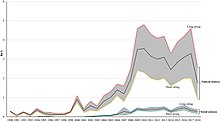
Scientific awards are one category of science incentives. Metascience can explore existing and hypothetical systems of science awards. For instance, it found that work honored by
A study found that delegation of responsibility by policy-makers – a centralized authority-based top-down approach – for knowledge production and appropriate funding to science with science subsequently somehow delivering "reliable and useful knowledge to society" is too simple.[52]
Measurements show that allocation of bio-medical resources can be more strongly correlated to previous allocations and research than to
A study suggests that "[i]f peer review is maintained as the primary mechanism of arbitration in the competitive selection of research reports and funding, then the scientific community needs to make sure it is not arbitrary".[43]
Studies indicate there to is a need to "reconsider how we measure success" .[42]
- Funding data
Funding information from grant databases and funding acknowledgment sections can be sources of data for scientometrics studies, e.g. for investigating or recognition of the impact of funding entities on the development of science and technology.[60]
Research questions and coordination
Risk governance
Science communication and public use
It has been argued that "science has two fundamental attributes that underpin its value as a global public good: that knowledge claims and the evidence on which they are based are made openly available to scrutiny, and that the results of scientific research are communicated promptly and efficiently".
Alternative metrics tools
Alternative metrics tools can be used not only for help in assessment (performance and impact)[59] and findability, but also aggregate many of the public discussions about a scientific paper in social media such as reddit, citations on Wikipedia, and reports about the study in the news media which can then in turn be analyzed in metascience or provided and used by related tools.[67] In terms of assessment and findability, altmetrics rate publications' performance or impact by the interactions they receive through social media or other online platforms,[68] which can for example be used for sorting recent studies by measured impact, including before other studies are citing them. The specific procedures of established altmetrics are not transparent[68] and the used algorithms can not be customized or altered by the user as open source software can. A study has described various limitations of altmetrics and points "toward avenues for continued research and development".[69] They are also limited in their use as a primary tool for researchers to find received constructive feedback.
Societal implications and applications
It has been suggested that it may benefit science if "intellectual exchange—particularly regarding the societal implications and applications of science and technology—are better appreciated and incentivized in the future".[59]
Knowledge integration
Primary studies "without context, comparison or summary are ultimately of limited value" and various types[additional citation(s) needed] of research syntheses and summaries integrate primary studies.[70] Progress in key social-ecological challenges of the global environmental agenda is "hampered by a lack of integration and synthesis of existing scientific evidence", with a "fast-increasing volume of data", compartmentalized information and generally unmet evidence synthesis challenges.[71] According to Khalil, researchers are facing the problem of too many papers – e.g. in March 2014 more than 8,000 papers were submitted to arXiv – and to "keep up with the huge amount of literature, researchers use reference manager software, they make summaries and notes, and they rely on review papers to provide an overview of a particular topic". He notes that review papers are usually (only)" for topics in which many papers were written already, and they can get outdated quickly" and suggests "wiki-review papers" that get continuously updated with new studies on a topic and summarize many studies' results and suggest future research.[72] A study suggests that if a scientific publication is being cited in a Wikipedia article this could potentially be considered as an indicator of some form of impact for this publication,[68] for example as this may, over time, indicate that the reference has contributed to a high-level of summary of the given topic.
Science journalism
Science journalists play an important role in the scientific ecosystem and in science communication to the public and need to "know how to use, relevant information when deciding whether to trust a research finding, and whether and how to report on it", vetting the findings that get transmitted to the public.[73]
Science education
Some studies investigate science education, e.g. the teaching about selected scientific controversies[74] and historical discovery process of major scientific conclusions,[75] and common scientific misconceptions.[76] Education can also be a topic more generally such as how to improve the quality of scientific outputs and reduce the time needed before scientific work or how to enlarge and retain various scientific workforces.
Science misconceptions and anti-science attitudes
Many students have misconceptions about what science is and how it works.
Evolution of sciences
Scientific practice
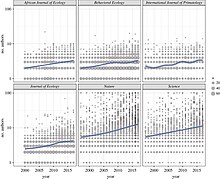
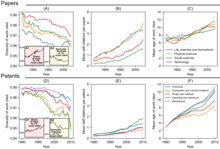
Metascience can investigate how scientific processes evolve over time. A study found that teams are growing in size, "increasing by an average of 17% per decade".[59]
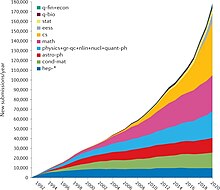
It was found that prevalent forms of non-open access publication and prices charged for many conventional journals – even for publicly funded papers – are unwarranted, unnecessary – or suboptimal – and detrimental barriers to scientific progress.[61][83][84][85] Open access can save considerable amounts of financial resources, which could be used otherwise, and level the playing field for researchers in developing countries.[86] There are substantial expenses for subscriptions, gaining access to specific studies, and for article processing charges. Paywall: The Business of Scholarship is a documentary on such issues.[87]
Another topic are the established styles of scientific communication (e.g. long text-form studies and reviews) and the
Science overall and intrafield developments

A study can be part of multiple fields[clarification needed] and lower numbers of papers is not necessarily detrimental[49] for fields.


Studies have various kinds of
Subject-level resolutions
Beyond metadata explicitly assigned to studies by humans, natural language processing and AI can be used to assign research publications to topics – one study investigating the impact of science awards used such to associate a paper's text (not just keywords) with the linguistic content of Wikipedia's scientific topics pages ("pages are created and updated by scientists and users through crowdsourcing"), creating meaningful and plausible classifications of high-fidelity scientific topics for further analysis or navigability.[97]
Growth or stagnation of science overall


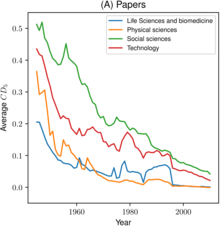
Metascience research is investigating the growth of science overall, using e.g. data on the number of publications in bibliographic databases. A study found segments with different growth rates appear related to phases of "economic (e.g., industrialization)" – money is considered as necessary input to the science system – "and/or political developments (e.g., Second World War)". It also confirmed a recent exponential growth in the volume of scientific literature and calculated an average doubling period of 17.3 years.[99]
However, others have pointed out that is difficult to measure scientific progress in meaningful ways, partly because it's hard to accurately evaluate how important any given scientific discovery is. A variety of perspectives of the trajectories of science overall (impact, number of major discoveries, etc) have been described in books and articles, including that science is becoming harder (per dollar or hour spent), that if science "slowing today, it is because science has remained too focused on established fields", that papers and patents are increasingly less likely to be "disruptive" in terms of breaking with the past as measured by the "CD index",[81] and that there is a great stagnation – possibly as part of a larger trend[100] – whereby e.g. "things haven't changed nearly as much since the 1970s" when excluding the computer and the Internet.
Better understanding of potential slowdowns according to some measures could be a major opportunity to improve humanity's future.[101] For example, emphasis on citations in the measurement of scientific productivity, information overloads,[100] reliance on a narrower set of existing knowledge (which may include narrow specialization and related contemporary practices) based on three "use of previous knowledge"-indicators,[81] and risk-avoidant funding structures[102] may have "toward incremental science and away from exploratory projects that are more likely to fail".[103] The study that introduced the "CD index" suggests the overall number of papers has risen while the total of "highly disruptive" papers as measured by the index hasn't (notably, the 1998 discovery of the accelerating expansion of the universe has a CD index of 0). Their results also suggest scientists and inventors "may be struggling to keep up with the pace of knowledge expansion".[104][81]
Various ways of measuring "novelty" of studies, novelty metrics,[103] have been proposed to balance a potential anti-novelty bias – such as textual analysis[103] or measuring whether it makes first-time-ever combinations of referenced journals, taking into account the difficulty.[105] Other approaches include pro-actively funding risky projects.[59]
Topic mapping
Science maps could show main interrelated topics within a certain scientific domain, their change over time, and their key actors (researchers, institutions, journals). They may help find factors determine the emergence of new scientific fields and the development of interdisciplinary areas and could be relevant for science policy purposes.
There are also studies that map a scientific field or a topic such as the study of the use of research evidence in policy and practice, partly using surveys.[111]
Controversies, current debates and disagreement

Some research is investigating
Challenges of interpretation of pooled results
Studies about a specific
Various issues with included or available studies such as, for example, heterogeneity of methods used may lead to faulty conclusions of the meta-analysis.[113]
Knowledge integration and living documents
Various problems require swift integration of new and existing science-based knowledge. Especially setting where there are a large number of loosely related projects and initiatives benefit from a common ground or "commons".[96]
Evidence synthesis can be applied to important and, notably, both relatively urgent and certain
Factors of success and progress
It has been hypothesized that a deeper understanding of factors behind successful science could "enhance prospects of science as a whole to more effectively address societal problems".[59]
Novel ideas and disruptive scholarship
Two metascientists reported that "structures fostering disruptive scholarship and focusing attention on novel
Mentorship, partnerships and social factors
Other researchers reported that the most successful – in terms of "likelihood of prizewinning, National Academy of Science (NAS) induction, or superstardom" – protégés studied under mentors who published research for which they were conferred a prize after the protégés' mentorship. Studying original topics rather than these mentors' research-topics was also positively associated with success.[117][118] Highly productive partnerships are also a topic of research – e.g. "super-ties" of frequent co-authorship of two individuals who can complement skills, likely also the result of other factors such as mutual trust, conviction, commitment and fun.[119][59]
Study of successful scientists and processes, general skills and activities
The emergence or origin of ideas by successful scientists is also a topic of research, for example reviewing existing ideas on how
Labor advantage
A study theorized that in many disciplines, larger scientific productivity or success by elite universities can be explained by their larger pool of available funded laborers.[126][127]The study found that university prestige was only associated with higher productivity for faculty with group members, not for faculty publishing alone or the group members themselves. This is presented as evidence that the outsize productivity of elite researchers is not from a more rigorous selection of talent by top universities, but from labor advantages accrued through greater access to funding and the attraction of prestige to graduate and postdoctoral researchers.
Ultimate impacts
Success in science (as indicated in tenure review processes) is often measured in terms of metrics like citations, not in terms of the eventual or potential impact on lives and society,
Progress studies
A proposed field of "Progress Studies" could investigate how scientists (or funders or evaluators of scientists) should be acting, "figuring out interventions" and study progress itself.[130] The field was explicitly proposed in a 2019 essay and described as an applied science that prescribes action.[131]
As and for acceleration of progress
A study suggests that improving the way science is done could accelerate the rate of scientific discovery and its applications which could be useful for finding urgent solutions to humanity's problems, improve humanity's conditions, and enhance understanding of nature. Metascientific studies can seek to identify aspects of science that need improvement, and develop ways to improve them.[72] If science is accepted as the fundamental engine of economic growth and social progress, this could raise "the question of what we – as a society – can do to accelerate science, and to direct science toward solving society's most important problems."[132] However, one of the authors clarified that a one-size-fits-all approach is not thought to be right answer – for example, in funding, DARPA models, curiosity-driven methods, allowing "a single reviewer to champion a project even if his or her peers do not agree", and various other approaches all have their uses. Nevertheless, evaluation of them can help build knowledge of what works or works best.[102]
Reforms
Meta-research identifying flaws in scientific practice has inspired reforms in science. These reforms seek to address and fix problems in scientific practice which lead to low-quality or inefficient research.
A 2015 study lists "fragmented" efforts in meta-research.[1]
Pre-registration
The practice of registering a scientific study before it is conducted is called
Reporting standards
Studies showing poor consistency and quality of reporting have demonstrated the need for reporting standards and guidelines in science, which has led to the rise of organisations that produce such standards, such as
The EQUATOR (Enhancing the QUAlity and Transparency Of health Research)[135] Network is an international initiative aimed at promoting transparent and accurate reporting of health research studies to enhance the value and reliability of medical research literature.[136] The EQUATOR Network was established with the goals of raising awareness of the importance of good reporting of research, assisting in the development, dissemination and implementation of reporting guidelines for different types of study designs, monitoring the status of the quality of reporting of research studies in the health sciences literature, and conducting research relating to issues that impact the quality of reporting of health research studies.[137] The Network acts as an "umbrella" organisation, bringing together developers of reporting guidelines, medical journal editors and peer reviewers, research funding bodies, and other key stakeholders with a mutual interest in improving the quality of research publications and research itself.
Applications
Information and communications technologies
Metascience is used in the creation and improvement of technical systems (
Study screening and feedback
Various websites or tools also identify inappropriate studies and/or enable feedback such as
Tools used, modified, extended or investigated
Tools may get developed with metaresearch or can be used or investigated by such. Notable examples may include:
- The tool scite.ai aims to track and link citations of papers as 'Supporting', 'Mentioning' or 'Contrasting' the study.[141][142][143]
- The Scite Reference Check bot is an extension of scite.ai that scans new article PDFs "for references to retracted papers, and posts both the citing and retracted papers on Twitter" and also "flags when new studies cite older ones that have issued corrections, errata, withdrawals, or expressions of concern".[143] Studies have suggested as few as 4% of citations to retracted papers clearly recognize the retraction.[143]
- Search engines like Google Scholar are used to find studies and the notification service Google Alerts enables notifications for new studies matching specified search terms. Scholarly communication infrastructure includes search databases.[144]
- Sci-hub is a topic of metascience[145]
- Personal knowledge management systems for research-, knowledge- and task management, such as saving information in organized ways[146] with multi-document text editors for future use[147][148] Such systems could be described as part of, along with e.g. Web browser (tabs-addons[149] etc) and search software,[additional citation(s) needed] "mind-machine partnerships" that could be investigated by metascience for how they could improve science.[59]
- Scholia – efforts to open scholarly publication metadata and use it via Wikidata.[150]
- Various software enables common metascientific practices such as bibliometric analysis.[151]
Development
According to a study "a simple way to check how often studies have been repeated, and whether or not the original findings are confirmed" is needed due to reproducibility issues in science.[152][153] A study suggests a tool for screening studies for early warning signs for research fraud.[154]
Medicine
Clinical research in medicine is often of low quality, and many studies cannot be replicated.
Studies have shown that systematic reviews of existing research evidence are sub-optimally used in planning a new research or summarizing the results.[167] Cumulative meta-analyses of studies evaluating the effectiveness of medical interventions have shown that many clinical trials could have been avoided if a systematic review of existing evidence was done prior to conducting a new trial.[168][169][170] For example, Lau et al.[168] analyzed 33 clinical trials (involving 36974 patients) evaluating the effectiveness of intravenous streptokinase for acute myocardial infarction. Their cumulative meta-analysis demonstrated that 25 of 33 trials could have been avoided if a systematic review was conducted prior to conducting a new trial. In other words, randomizing 34542 patients was potentially unnecessary. One study[171] analyzed 1523 clinical trials included in 227 meta-analyses and concluded that "less than one quarter of relevant prior studies" were cited. They also confirmed earlier findings that most clinical trial reports do not present systematic review to justify the research or summarize the results.[171]
Many treatments used in modern medicine have been proven to be ineffective, or even harmful. A 2007 study by John Ioannidis found that it took an average of ten years for the medical community to stop referencing popular practices after their efficacy was unequivocally disproven.[172][173]
Psychology
Metascience has revealed significant problems in psychological research. The field suffers from high bias, low reproducibility, and widespread misuse of statistics.[174][175][176] The replication crisis affects psychology more strongly than any other field; as many as two-thirds of highly publicized findings may be impossible to replicate.[177] Meta-research finds that 80-95% of psychological studies support their initial hypotheses, which strongly implies the existence of publication bias.[178]
The replication crisis has led to renewed efforts to re-test important findings.
Psychologists routinely confuse
Physics
Richard Feynman noted that estimates of physical constants were closer to published values than would be expected by chance. This was believed to be the result of confirmation bias: results that agreed with existing literature were more likely to be believed, and therefore published. Physicists now implement blinding to prevent this kind of bias.[183]
Computer Science
Web measurement studies are essential for understanding the workings of the modern Web, particularly in the fields of security and privacy. However, these studies often require custom-built or modified crawling setups, leading to a plethora of analysis tools for similar tasks. In a paper by Nurullah Demir et al., the authors surveyed 117 recent research papers to derive best practices for Web-based measurement studies and establish criteria for reproducibility and replicability. They found that experimental setups and other critical information for reproducing and replicating results are often missing. In a large-scale Web measurement study on 4.5 million pages with 24 different measurement setups, the authors demonstrated the impact of slight differences in experimental setups on the overall results, emphasizing the need for accurate and comprehensive documentation.[184]
Organizations and institutes
There are several organizations and universities across the globe which work on meta-research – these include the Meta-Research Innovation Center at Berlin,
See also
- Accelerating change
- Basic research
- Citation analysis
- Epistemology
- Evidence-based practices
- Evidence-based medicine
- Evidence-based policy
- Further research is needed
- HARKing
- Logology (science)
- Metadata § Science
- Metatheory
- Open science
- Philosophy of science
- Science of science policy
- Sociology of scientific knowledge
- Self-Organized Funding Allocation
References
- ^ PMID 26431313.
- ^ Bach, Becky (8 December 2015). "On communicating science and uncertainty: A podcast with John Ioannidis". Scope. Retrieved 20 May 2019.
- S2CID 1342421.
- ISSN 0958-2029.
- ^ PMID 16060722.
- PMID 5952081.
- JSTOR 1741888. Retrieved 2023-12-14.
- ^ "Highly Cited Researchers". Retrieved September 17, 2015.
- ^ Medicine - Stanford Prevention Research Center. John P.A. Ioannidis
- ^ Robert Lee Hotz (September 14, 2007). "Most Science Studies Appear to Be Tainted By Sloppy Analysis". Wall Street Journal. Dow Jones & Company. Retrieved 2016-12-05.
- ^ Howick J, Koletsi D, Pandis N, Fleming PS, Loef M, Walach H, Schmidt S, Ioannidis JA. The quality of evidence for medical interventions does not improve or worsen: a metaepidemiological study of Cochrane reviews. Journal of Clinical Epidemiology 2020;126:154-159 [1]
- PMID 24769715.
- S2CID 206626417.
- PMID 2304208.
- PMID 29451544.
- PMID 28320937.
- S2CID 211729036. Retrieved 9 May 2019.
- S2CID 146174471.
- S2CID 3752804.
- PMID 25510373.
- S2CID 73471103.
- ^ S2CID 115360831.
- PMID 25373639.
- ^ Smith, Noah (2 November 2017). "Why 'Statistical Significance' Is Often Insignificant". Bloomberg.com. Retrieved 7 November 2017.
- S2CID 26361121.
- ^ Gary Marcus (May 1, 2013). "The Crisis in Social Psychology That Isn't". The New Yorker.
- ^ Jonah Lehrer (December 13, 2010). "The Truth Wears Off". The New Yorker.
- ^ "Dozens of major cancer studies can't be replicated". Science News. 7 December 2021. Retrieved 19 January 2022.
- ^ "Reproducibility Project: Cancer Biology". www.cos.io. Center for Open Science. Retrieved 19 January 2022.
- ^ Staddon, John (2017) Scientific Method: How science works, fails to work or pretends to work. Taylor and Francis.
- PMID 28979201.
- PMID 28443044.
- )
- PMID 28115824.
- ^ Brookshire, Bethany (21 October 2016). "Blame bad incentives for bad science". Science News. Retrieved 11 July 2019.
- PMID 27703703.
- ^ S2CID 208605640.
- .
- PMID 29487213.
- S2CID 45167271.
- S2CID 256770827.
- ^ PMID 31144712.
- ^ S2CID 212778011.
- .
- ^ "Bringing Rigor to Relevant Questions: How Social Science Research Can Improve Youth Outcomes in the Real World" (PDF). Retrieved 22 November 2021.
- S2CID 34449408.
- S2CID 254331807. Retrieved 18 December 2022.
- ^ Leydesdorff, L. and Milojevic, S., "Scientometrics" arXiv:1208.4566 (2013), forthcoming in: Lynch, M. (editor), International Encyclopedia of Social and Behavioral Sciences subsection 85030. (2015)
- ^ arXiv:2201.07985 [physics.soc-ph].
- S2CID 243865632.
- ^ Manchanda, Saurav; Karypis, George. "Importance Assessment in Scholarly Networks" (PDF).
- ^ S2CID 226237994.
- ISBN 978-0199678112.
- ISBN 978-1526600219.
- ^ "Technology is changing faster than regulators can keep up - here's how to close the gap". World Economic Forum. 21 June 2018. Retrieved 27 January 2022.
- S2CID 212789228.
- ^ "Nobel prize-winning work is concentrated in minority of scientific fields". phys.org. Retrieved 17 August 2020.
- PMID 32726312.
- ^ PMID 29496846. Retrieved 22 November 2021.
- S2CID 235266330.
- ^ a b "Science as a Global Public Good". International Science Council. 8 October 2021. Retrieved 22 November 2021.
- ISBN 978-0190497637.
- S2CID 213125031.
- ^ G. Manickam Govindaraju; Kalei Joethi Sahadevan; Tan Poh Ling (February 2019). "Framing Analysis of News Coverage on Renewable Energy in the Star Online News Portal" (PDF). Journal of Engineering Science and Technology. Retrieved 22 November 2021.
- S2CID 49412893.
- S2CID 243760357.
- ISBN 978-0081001950.
- ^ S2CID 222177064.
- .
- ^ S2CID 3761687.
- S2CID 246872765.
- ^ ISBN 978-3-319-20716-2.
- ^ "How Do Science Journalists Evaluate Psychology Research?". psyarxiv.com.
- S2CID 255016078.
- ISBN 978-3-319-20716-2.
- S2CID 254792908.
- ^ "Correcting misconceptions - Understanding Science". 21 April 2022. Retrieved 25 January 2023.
- PMID 35858405.
- ^ "The 4 bases of anti-science beliefs – and what to do about them". SCIENMAG: Latest Science and Health News. 11 July 2022. Retrieved 25 January 2023.
- ^ Hotez, Peter J. "The Antiscience Movement Is Escalating, Going Global and Killing Thousands". Scientific American. Retrieved 25 January 2023.
- ^ S2CID 255466666.
- PMID 34377944.
- ^ "Nature Journals To Charge Authors Hefty Fee To Make Scientific Papers Open Access". IFLScience. Retrieved 22 November 2021.
- ^ "Harvard University says it can't afford journal publishers' prices". The Guardian. 24 April 2012. Retrieved 22 November 2021.
- S2CID 27021567.
- PMID 27158456.
- ^ "Paywall: The business of scholarship review – analysis of a scandal". New Scientist. Retrieved 28 January 2023.
- S2CID 1013588.
- ^ "Open peer review: bringing transparency, accountability, and inclusivity to the peer review process". Impact of Social Sciences. 13 September 2017. Retrieved 28 January 2023.
- ^ Dattani, Saloni. "The Pandemic Uncovered Ways to Speed Up Science". Wired. Retrieved 28 January 2023.
- ^ "Speeding up the publication process at PLOS ONE". EveryONE. 13 May 2019. Retrieved 28 January 2023.
- ^ a b "Open Alex Data Evolution". observablehq.com. 8 February 2022. Retrieved 18 February 2022.
- . Retrieved 14 February 2022.
- ^ "OpenAlex: The Promising Alternative to Microsoft Academic Graph". Singapore Management University (SMU). Retrieved 14 February 2022.
- ^ "OpenAlex Documentation". Retrieved 18 February 2022.
- ^ PMID 33482803.
- PMID 34611161.
- ^ "Scholia – biomarker". Retrieved 28 January 2023.
- S2CID 229156128.
- ^ a b Thompson, Derek (1 December 2021). "America Is Running on Fumes". The Atlantic. Retrieved 27 January 2023.
- ^ Collison, Patrick; Nielsen, Michael (16 November 2018). "Science Is Getting Less Bang for Its Buck". The Atlantic. Retrieved 27 January 2023.
- ^ a b "How to escape scientific stagnation". The Economist. Retrieved 25 January 2023.
- ^ a b c Bhattacharya, Jay; Packalen, Mikko (February 2020). "Stagnation and Scientific Incentives" (PDF). National Bureau of Economic Research.
- ^ Tejada, Patricia Contreras (13 January 2023). "With fewer disruptive studies, is science becoming an echo chamber?". Advanced Science News. Archived from the original on 15 February 2023. Retrieved 15 February 2023.
- ISSN 0048-7333.
- ^ Petrovich, Eugenio (2020). "Science mapping". www.isko.org. Retrieved 27 January 2023.
- S2CID 57737772.
- S2CID 254227914.
- PMID 18524802.
- ^ ISSN 2214-6296.
- ISSN 2662-9992.
- ^ PMID 34951588.
- ISSN 1053-4822.
- S2CID 245220047.
- ^ Snyder, Alison (14 October 2021). "New ideas are struggling to emerge from the sea of science". Axios. Retrieved 15 November 2021.
- PMID 34607941.
- ^ "Sharing of tacit knowledge is most important aspect of mentorship, study finds". phys.org. Retrieved 4 July 2020.
- PMID 32522881.
- ^ "Science of Science authors hope to spark conversations about the scientific enterprise". phys.org. Retrieved 28 January 2023.
- S2CID 250454204.
- ISSN 1040-0419.
- S2CID 247078086.
- ^ Nassi-Calò, Lilian (3 April 2014). "Researchers reading habits for scientific literature | SciELO in Perspective". Retrieved 25 February 2023.
- . Retrieved 25 February 2023.
- S2CID 229433047.
- ^ "Why it pays to join a big research group if you want to be more scientifically productive". Physics World. 24 November 2022. Retrieved 13 December 2022.
- PMID 36399560.
- ^ Dunn, Katharine. "LibGuides: Promotion & Tenure and Open Scholarship: How is "impact" measured & valued?". libguides.mit.edu. Retrieved 2024-03-14.
- ^ "Academic Incentives and Research Impact: Developing Reward and Recognition Systems to Better People's Lives". DORA. Retrieved 28 January 2023.
- ^ Collison, Patrick; Cowen, Tyler (30 July 2019). "We Need a New Science of Progress". The Atlantic. Retrieved 25 January 2023.
- ^ Lovely, Garrison. "Do we need a better understanding of 'progress'?". BBC. Retrieved 27 January 2023.
- ^ Niehaus, Paul; Williams, Heidi. "Developing the science of science". Works in Progress. Retrieved 25 January 2023.
- ^ "Registered Replication Reports". Association for Psychological Science. Retrieved 2015-11-13.
- ^ Chambers, Chris (2014-05-20). "Psychology's 'registration revolution'". the Guardian. Retrieved 2015-11-13.
- PMID 20420659.
- PMID 20055895.
- S2CID 36739841.
- ^ Ep. 49: Joel Chan on metascience, creativity, and tools for thought.
- ^ "Risk of Bias Tool | Cochrane Bias". methods.cochrane.org. Retrieved 25 January 2023.
- PMID 35869811.
- . Retrieved 19 February 2022.
- S2CID 232283218.
- ^ a b c "New bot flags scientific studies that cite retracted papers". Nature Index. 2 February 2021. Retrieved 25 January 2023.
- S2CID 253385733.
- S2CID 254564205.
- S2CID 250388551. Retrieved 28 January 2023.
- ISBN 978-3-319-20611-0.
- S2CID 253363619.
- S2CID 237102658.
- S2CID 247936371.
- S2CID 210926828.
- ^ "A new replication crisis: Research that is less likely to be true is cited more". phys.org. Retrieved 14 June 2021.
- PMID 34020944.
- S2CID 250632662.
- PMID 27328301.
- PMID 16014596.
- S2CID 11797088.
- ^ June 24, Jeremy Hsu; ET, Jeremy Hsu (24 June 2010). "Dark Side of Medical Research: Widespread Bias and Omissions". Live Science. Retrieved 24 May 2019.
{{cite web}}: CS1 maint: numeric names: authors list (link) - PMID 30401866.
- PMID 29775468.
- PMID 11872507.
- PMID 24973822.
- PMID 23898156.
- PMID 25279271.
- PMID 18505564.
- PMID 20332509.
- PMID 9676682.
- ^ PMID 1614465.
- S2CID 31375469.
- PMID 25068257.
- ^ S2CID 207536137.
- ^ Epstein, David. "When Evidence Says No, but Doctors Say Yes - The Atlantic". Pocket. Retrieved 10 April 2020.
- PMID 18056905.
- S2CID 143182733.
- ISSN 1476-4687.
- S2CID 158525979.
- S2CID 218065162.
- ^ )
- PMID 22006061.
- S2CID 31938129.
- ^ Aschwanden, Christie (6 December 2018). "Psychology's Replication Crisis Has Made The Field Better". FiveThirtyEight. Retrieved 19 December 2018.
- S2CID 380942.
- PMID 26450040.
- .
- ^ Berlin, Meta-Research Innovation Center. "Meta-Research Innovation Center Berlin". Meta-Research Innovation Center Berlin. Retrieved 2021-12-06.
- ^ "Home | Meta-research Innovation Center at Stanford". metrics.stanford.edu. Retrieved 2021-12-06.
- ^ "Meta-research and Evidence Synthesis Unit". The George Institute for Global Health. Retrieved 2021-12-19.
- ^ "AIMOS 2022". AIMOS 2022. Retrieved 20 March 2023.
- ^ "Metascience 2023". Metascience 2023 Conference. Retrieved 20 March 2023.
Further reading
- Bonett, D.G. (2021). Design and analysis of replication studies. Organizational Research Methods, 24, 513-529. https://doi.org/10.1177/1094428120911088
- Lydia Denworth, "A Significant Problem: Standard scientific methods are under fire. Will anything change?", Scientific American, vol. 321, no. 4 (October 2019), pp. 62–67.
- "The use of p values for nearly a century [since 1925] to determine statistical significance of experimental results has contributed to an illusion of certainty and [to] reproducibility crises in many scientific fields. There is growing determination to reform statistical analysis... Some [researchers] suggest changing statistical methods, whereas others would do away with a threshold for defining "significant" results." (p. 63.)
- "The use of
- Harris, Richard (2017). Rigor Mortis: How Sloppy Science Creates Worthless Cures, Crushes Hopes, and Wastes Billions. Basic Books. ISBN 978-0465097913.
- Fortunato, Santo; Bergstrom, Carl T.; et al. (2 March 2018). "Science of science". Science. 359 (6379): eaao0185. PMID 29496846.
External links
Journals
- Minerva: A Journal of Science, Learning and Policy
- Research Integrity and Peer Review
- Research Policy
- Science and Public Policy
